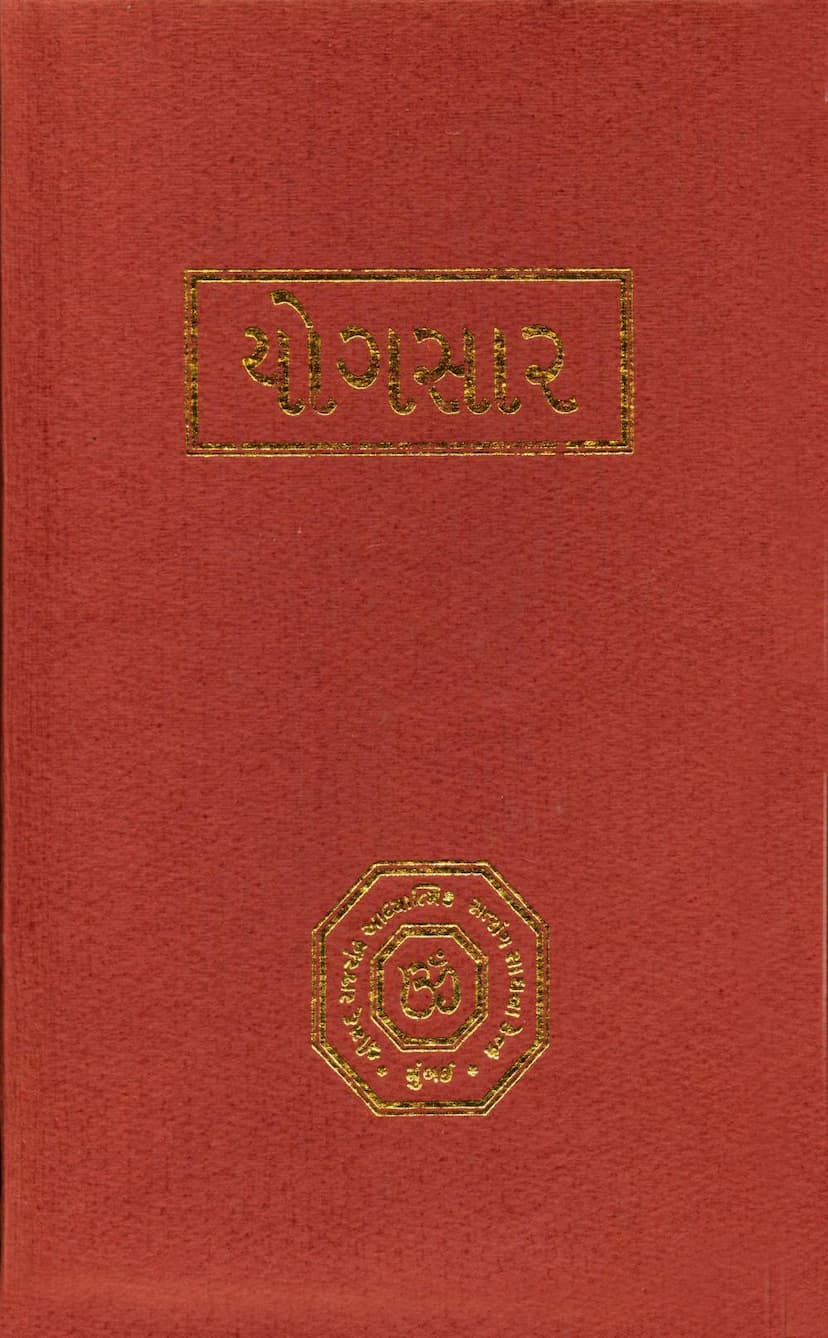Yogsara
Added to library: September 2, 2025

Summary
This document is a Gujarati translation and presentation of the Jain text Yogsara (Meaning: The Essence of Yoga), originally composed by Yogindudev. The publication is by the Shrimad Rajchandra Adhyatmik Satsang Sadhna Kendra in Mumbai, released in 1998.
The "Yogsara" is presented as a guide to achieving liberation (moksha) by focusing on the self (atma). The text emphasizes that the path to moksha is not external but resides within the soul.
Here's a breakdown of the content:
- Introduction (Prastavana): The introduction highlights the teachings of Paramkrupalsu Shrimad Rajchandra, who emphasized self-realization as the path to moksha. It states that the Shrimad Rajchandra Adhyatmik Satsang Sadhna Kendra, under the guidance of P.P. Shri Rakeshbhai, has been dedicated to this path for over a decade. The introduction mentions that every year, during the Paryushan festival, the Kendra organizes study sessions on significant spiritual texts. In this particular year, the focus is on Yogindudev's Yogsara.
- About Yogindudev: Yogindudev is described as a dispassionate Digambar acharya, whose main works are Parmatma Prakash and Yogsara. These works are noted for their engaging style and composition in Prakrit. Yogindudev is believed to have lived in the 6th century CE, with no further information available about his place or time.
- Meaning of Yogsara: The title Yogsara is explained as "Yoga" (union) + "Sara" (essence). Yoga here refers to the soul's connection with its pure, eternal knowing nature through right faith, knowledge, and conduct. This union is inherently "Sara" or excellent because it is free from delusion and desires.
- Guidance for Study: The introduction provides two key quotes from Shrimad Rajchandra as guiding principles for understanding Yogsara:
- One should not misinterpret the teachings of the wise for a particular viewpoint.
- As one's renunciation, detachment, and devotion increase, the words of the virtuous become clearer, and means of liberation become easier.
- Content of Yogsara (as presented through verses): The core of the document presents the verses (Gathas) of Yogsara with their Gujarati translations and explanations. The verses cover a wide range of Jain philosophical concepts, including:
- Invocation: Salutations to the Siddhas and Arihants.
- Purpose of the text: To guide those fearful of the cycle of birth and death towards the path of liberation.
- The cycle of existence: The soul's endless wandering through various life forms due to ignorance and delusion.
- The three types of souls: Bahiratma (external self), Antaratma (internal self), and Paramatma (supreme self).
- Identification: Mistaking the body and other non-soul entities as the self (Bahiratma) leads to continued wandering, while understanding the true nature of the soul leads to liberation.
- The nature of the soul: Described as pure, formless, omniscient, and blissful.
- The path to liberation: Emphasizes self-knowledge, renunciation of worldly attachments (per-bhav), detachment from the body, ethical conduct (vrata, samyama, sheel), meditation, and equanimity (samata).
- The futility of external rituals: The text stresses that mere external actions, penances, or scriptural study without self-realization are insufficient for moksha.
- The true nature of religion: True dharma is found in living a life of detachment (vitragata), equanimity, and dwelling within the pure soul.
- The importance of discrimination: The distinction between soul (jiva) and non-soul (ajiva) is crucial for liberation.
- The self as the divine: The soul's inherent nature is identified with the divine qualities attributed to the liberated souls (Arihants, Siddhas, etc.).
- The body as a temple: The body is the true abode of the divine, not external temples or idols.
- The power of self-knowledge: Knowing oneself leads to the attainment of omniscience and eternal happiness.
- The essence of Jain principles: Concepts like the nine cardinal principles (navapadarthas) and the six substances (dravyas) are mentioned as part of the understanding to be gained.
- The path of the virtuous: The text extols those who renounce worldly possessions and attachments and focus on the soul.
- Concluding Remarks: The document concludes with wishes for the readers to gain clarity, cultivate a taste for the spiritual, increase their efforts, and find inner peace through the study of Yogsara. It expresses a hope that all beings will be freed from delusion and attain the essence of yoga.
In essence, Yogsara is a profound Jain text that guides the seeker towards recognizing the true, pure, and blissful nature of the soul, emphasizing that this inner realization, achieved through detachment, equanimity, and self-knowledge, is the sole path to liberation from the cycle of birth and death.